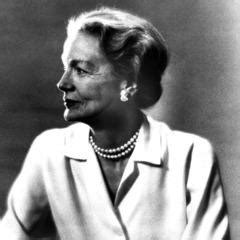
Congresswoman Edith Nourse Rogers was born on March 19, 1881 in the town of Saco, Maine where her parents owned a textile plant. She was educated in a private MA school, as well as in Paris. She married Harvard-trained attorney John Jacob Rogers in 1907, and they settled in Lowell where she had attended school. In 1913, John Rogers was elected to the 63rd Congress, as well as six more terms after that, climbing to the position of Ranking Majority Member on the Foreign Affairs Committee.
Throughout his tenure, Edith served as a valuable conduit of advice. During World War I, Edith went with him overseas where she inspected field hospitals with the Women’s Overseas Service League. “No one could see the wounded and dying as I saw them and not be moved to do all in his or her power to help,” she said. Back in Washington, she volunteered as a nurse with the American Red Cross, and hospitalized veterans nicknamed her the “Angel of Walter Reed.” After the war, she continued to advocate for American veterans as an auxiliary member of the American Legion and through an appointment by President Harding as an inspector of the newly-formed veterans’ hospitals.
When her husband died on March 28, 1925 after a lengthy battle with cancer, Edith decided to run for his seat in a special election a week after his passing, handily winning the primary. She went on to a decisive victory over a former governor with 72% of the vote. The first female Congresswoman to serve Massachusetts, Rogers spent nearly four-decades and 18 consecutive terms in the U.S. House of Representatives, longer than any other woman.
Rogers was charismatic, and her sense of humor endeared her to voters and colleagues. Noting her 18-hour days, the press dubbed her “the busiest woman on Capitol Hill.” Veterans’ issues defined Rogers’ House career. For example, in 1926 she secured pensions for army nurses and later helped create a permanent nurse corps within the Veterans Administration. In 1930, Rogers inserted a $15 million provision for the development of a national network of veterans’ hospitals into the Veterans Administration Act, over the objections of the committee chairman.
Veterans adored her. One of them said, “She never disappoints.” During World War II and directly afterwards, she introduced the Women’s Army Auxiliary Corps Act, to create a voluntary enrollment program for women to join the U.S. Army in a noncombat capacity. She told her colleagues this would give “women a chance to volunteer to serve their country in a patriotic way,” and they went on to do so in medicine, as welfare and clerical workers, cooks, messengers, military postal employees, chauffeurs, telephone and telegraph operators, among many other capacities.
On May 14, 1942, the Women’s Army Auxiliary Corps (WAAC) Act was signed into law, and upwards of 150,000 women served in noncombatant duty with the U.S. Army. A year later that measure was supplanted by her Women’s Army Corps Bill, granting official military status to those volunteers through the creation of the Women’s Army Corps or WACs. This paved the way for other uniformed women’s services, in the Navy (WAVEs) and the Air Force (WASPs).
Looking ahead to victory, Rogers worked to ease the transition of active duty servicemen to civilian life by creating assistance programs, and sponsoring the G.I. Bill of Rights, which passed the House in 1944. Returning GI’s would be able to receive college tuition benefits and low-interest home mortgage loans. In 1952, these benefits were extended to veterans of the Korean War.
The American Legion awarded Rogers its Distinguished Service Cross—making her the first woman to receive the honor. When Rogers died of pneumonia in Boston on Sept. 10, 1960 at the age of 79, Sen. Everett M. Dirksen remarked, “The death of Congressman Rogers will cause a twinge of regret in every veteran’s heart.” The governor of Massachusetts, said, “She was truly a remarkable woman. “She will long be remembered with affection by hundreds of thousands of veterans for her espousal of the G.I. Bill following World War II and for her continuing efforts through the years in behalf of veterans legislation and military affairs.”
You can hear this story on my podcast, American Stories with Rebecca Price Janney at Anchor.fm/rebeccapricejanney

Leave a Reply